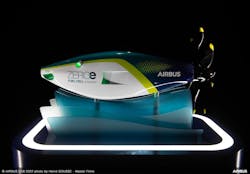Is quantum computing an enabler for the decarbonization of aviation?
TOULOUSE, France - It is still early days for quantum computing. Yet experts agree it is poised to play a key role in sectors ranging from secure communications to banking and aerospace. Quantum’s appeal lies in its ability to overcome computational bottlenecks, Airbus says. Continue reading original article.
The Military & Aerospace Electronics take:
26 April 2024 -Airbus says it is exploring quantum computing technology to optimize trajectory in real-time with data from weather and area air traffic restrictions, cargo loading, fuel cell simulation, and fluid dynamics.
Regarding fuel cell research, Airbus says that it plans to start ground and flight testing this fuel cell engine architecture onboard its ZEROe demonstrator aircraft towards the middle of the decade. The A380 MSN1 flight test aircraft for new hydrogen technologies is currently being modified to carry liquid hydrogen tanks and their associated distribution systems.
"Fuel cells are a potential solution to help us achieve our zero-emission ambition and we are focused on developing and testing this technology to understand if it is feasible and viable for a 2035 entry-into-service of a zero-emission aircraft," said Glenn Llewellyn, VP Zero-Emission Aircraft, Airbus. "At scale, and if the technology targets were achieved, fuel cell engines may be able to power a one hundred passenger aircraft with a range of approximately 1,000 nautical miles. By continuing to invest in this technology we are giving ourselves additional options that will inform our decisions on the architecture of our future ZEROe aircraft, the development of which we intend to launch in the 2027-2028 timeframe."
Related: Airbus, Quantinuum, and BMW collaborate on fuel cell research with quantum computers
Jamie Whitney, Senior Editor
Military + Aerospace Electronics
